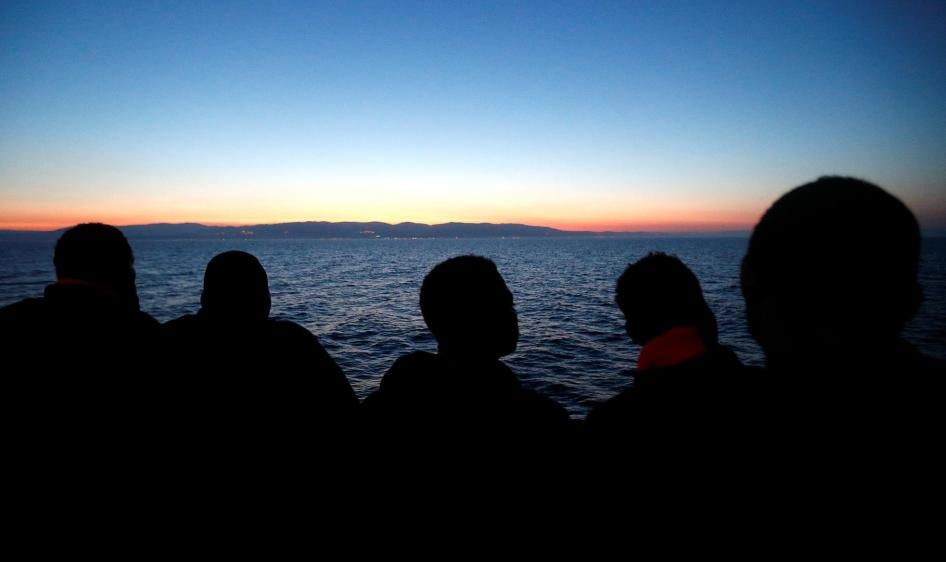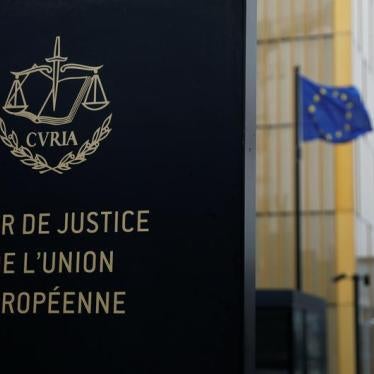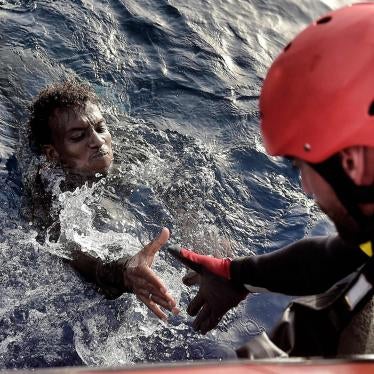No one pretends there is an easy way for the European Union to manage the flow of asylum seekers and other migrants arriving by boat from Libya. Yet there are certain basic principles of human rights—and decency—that should guide the EU response.
The Mediterranean crossing from Libya toward Italy has become the world’s most dangerous. Some 103,000 people have survived the journey this year through late September, but 2,471 have drowned or gone missing.
What would lead anyone to risk such a perilous journey? Some flee persecution or violence at home. Others, fleeing crushing poverty, hope for a better life in Europe. But all have traversed Libya, one of the world’s most inhospitable places for migrants.
Divided today among three competing authorities, Libya has become a smuggler’s paradise and a migrant’s nightmare. Non-Libyan migrants seeking transit to Europe are typically corralled and kept in squalid, overcrowded detention centers where malnutrition and illness are widespread, and forced labor, beatings, sexual abuse and torture are rife. The UN Refugee Agency estimates that more migrants are killed crossing Libya these days than die at sea.
International refugee law prohibits forcibly returning anyone to such conditions, which is why boats rescuing migrants—whether operated by the EU, Italy, or nongovernmental groups—don’t return them. So far, most have been taken to Italy.
Some, such as Italy’s 5 Star Movement and the far-right Northern League, criticize these rescue efforts as a “pull factor,” but there is no evidence that ending them would deter the migrants from embarking. It would, however, increase the drownings.
Many of the other ideas offered for managing the flow have been similarly flawed. French President Emmanuel Macron briefly suggested that the EU screen asylum seekers inside Libya to avert the need for them to take to the sea, but he quickly withdrew the idea once it was pointed out that Libya is safe neither for the screeners nor anyone seeking to be screened.
The EU is supporting Libyan coastal forces, arguing that they will curtail smugglers and save lives, but under current circumstances these forces are doing indirectly what the EU is prohibited from doing directly—sending people back to the horrible, lawless conditions of detention. Separate deals with militias who would otherwise be involved in smuggling may be behind the significant drop in boat departures during the summer – normally a peak crossing period – but no one can predict how long that will hold. In the meantime, those who might have escaped remain trapped in a hellish environment.
The EU and its member states have also supported other countries where migrants originate, hoping to shut off the flow at the source. But supporting, for example, border forces like Sudan’s, which have integrated former militias implicated in atrocities such as slaughtering civilians, to stop people from fleeing the brutal dictatorship in Eritrea is wrong on both fronts.
Yet there are steps that the EU should prioritize.
Economic development assistance to countries that are the source of large-scale economic migration to Europe may help, at least in the long term.
Educating would-be migrants about the dangers of traveling through Libya or taking to the sea with smugglers may also help to curtail the flow.
Increasing safe and legal channels into Europe—through more generous refugee resettlement from countries other than Libya, family reunification, and humanitarian, work and study visas—would provide some people with options safer than risking their lives crossing Libya and the Mediterranean. And it would enhance Europe’s response to the global refugee crisis, currently handled mainly by poorer countries.
Still, given the desperation of people fleeing toward Europe, many inevitably will continue to undertake the dangerous journey. Those who make it have a right to a hearing on their claim to stay in EU states, whether by virtue of a need for asylum, family reunification, or humanitarian relief.
Because of the EU’s Dublin Regulations, which require these claims to be examined where an asylum seeker first arrives, the burden has fallen mainly on Italy and Greece, both overwhelmed by large numbers of migrants and severe economic problems. A binding EU decision to relocate 160,000 asylum seekers to other member states has been carried out by only a few countries, with the result that, as it ended in September, only 9,078 had been relocated from Italy, fewer than the average number of new arrivals there in a single month.
Revising these outdated rules, while sharing responsibility more evenly among EU governments, would ensure prompter hearings and thus the quicker return to their home countries of migrants who, after fair consideration of their claims, are found ineligible to stay. Those would be key steps for discouraging migrants from attempting the journey without a plausible legal claim to stay in the EU. One starting point would be for other EU countries operating in the Mediterranean to accept Italy’s request to take some rescued migrants to their own ports for processing, not only to Italy.
The EU’s current out-of-sight-out-of-mind policy—trying to barricade even legitimate asylum seekers inside Italy or Greece—is guaranteed to aggravate the human hardship. The undeniable strain on these two countries, and the political and social tension that it fuels, could be minimized if responsibility were shared across more countries.
None of these steps would be a panacea. Complex problems do not admit simple solutions. Yet a response guided by human rights principles—as well as greater cooperation and compassion—would ensure that the EU stays true to its founding principles as it grapples with the latest challenge to its borders.










